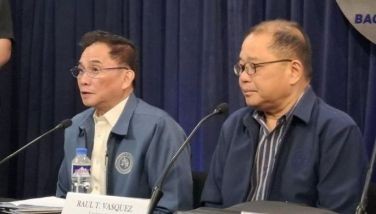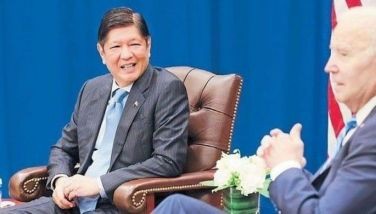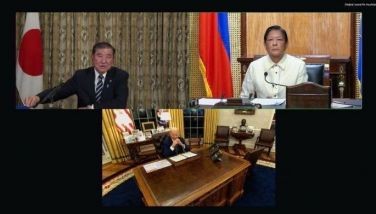WHO: No need to wear anti-SARS masks in RP
April 29, 2003 | 12:00am
The World Health Organization (WHO) is not yet advising the use of N-95 surgical masks in the country to prevent the spread of the lethal coronavirus.
This developed as the WHO lauded the Philippine government’s handling and free flow of information on Severe Acute Respiratory Syndrome (SARS) cases.
WHO representative to the Philippines Jean Marc Olive told the diplomatic community at a briefing yesterday that the agency is not yet recommending the use of these masks as protective gear because there is no local transmission of the killer pneumonia.
The briefing was given by the Department of Foreign Affairs (DFA) and attended by personnel of the Department of Health (DOH) and ambassadors and representatives of the different embassies in Manila.
"Only people who are taking care of suspected SARS patients (need to wear masks) and not only masks — much, much more. For the moment, I will not wear a mask," Olive said.
However, he said the WHO is leaving it up to the public whether they will use masks to protect themselves from SARS.
Responding to reporters’ queries, Olive said the government, particularly the DOH, has done quite well in reporting real number cases and treating suspected SARS patients.
"It is a learning process. The DOH, it seems they have done quite well," he said.
Olive added that the diplomatic community’s concern over SARS is legitimate because the disease is new and a cure for it has yet to be found.
He recommended that the DFA and DOH provide "the best information possible, which are forwarded to medical and non-medical people who are at risk."
The DFA announced to the diplomatic community that it is considering requiring all Philippine-bound passengers from SARS-listed countries to present SARS-free medical clearances at ports or exit and at immigration counters as part of guidelines for entering the Philippines.
The DFA is also continuously disseminating SARS-related information to all embassies and consulates, placing SARS-awareness posters in areas of public transaction. The DFA is also distributing surgical masks to all its front-line personnel.
Due to SARS jitters, Filipinos have opted not to leave the country — as shown by the over 30 percent drop in passport applications from March to April, normally the peak season for obtaining passports.
Director Bernardita Catalla attributed the drop in passport applications to the SARS scare, with the volume dropping from an average of 2,500 to 1,800 applications daily.
On the other hand, Catalla said she is still worried over the number of people going to the DFA. The DFA has already encouraged people to wear masks when going to its offices on the corner of Roxas Boulevard and Libertad St. in Pasay City.
Many of the people visiting the DFA passport division are there to renew their passports and have been to countries where SARS may be present, Catalla said. "We do not know where they are coming from."
Those who have been issued masks at the DFA are the personnel of the Consular Affairs division and security guards assigned to those offices. The Consular Affairs division deals with the public regarding passport applications.
This developed as the WHO lauded the Philippine government’s handling and free flow of information on Severe Acute Respiratory Syndrome (SARS) cases.
WHO representative to the Philippines Jean Marc Olive told the diplomatic community at a briefing yesterday that the agency is not yet recommending the use of these masks as protective gear because there is no local transmission of the killer pneumonia.
The briefing was given by the Department of Foreign Affairs (DFA) and attended by personnel of the Department of Health (DOH) and ambassadors and representatives of the different embassies in Manila.
"Only people who are taking care of suspected SARS patients (need to wear masks) and not only masks — much, much more. For the moment, I will not wear a mask," Olive said.
However, he said the WHO is leaving it up to the public whether they will use masks to protect themselves from SARS.
Responding to reporters’ queries, Olive said the government, particularly the DOH, has done quite well in reporting real number cases and treating suspected SARS patients.
"It is a learning process. The DOH, it seems they have done quite well," he said.
Olive added that the diplomatic community’s concern over SARS is legitimate because the disease is new and a cure for it has yet to be found.
He recommended that the DFA and DOH provide "the best information possible, which are forwarded to medical and non-medical people who are at risk."
The DFA announced to the diplomatic community that it is considering requiring all Philippine-bound passengers from SARS-listed countries to present SARS-free medical clearances at ports or exit and at immigration counters as part of guidelines for entering the Philippines.
The DFA is also continuously disseminating SARS-related information to all embassies and consulates, placing SARS-awareness posters in areas of public transaction. The DFA is also distributing surgical masks to all its front-line personnel.
Due to SARS jitters, Filipinos have opted not to leave the country — as shown by the over 30 percent drop in passport applications from March to April, normally the peak season for obtaining passports.
Director Bernardita Catalla attributed the drop in passport applications to the SARS scare, with the volume dropping from an average of 2,500 to 1,800 applications daily.
On the other hand, Catalla said she is still worried over the number of people going to the DFA. The DFA has already encouraged people to wear masks when going to its offices on the corner of Roxas Boulevard and Libertad St. in Pasay City.
Many of the people visiting the DFA passport division are there to renew their passports and have been to countries where SARS may be present, Catalla said. "We do not know where they are coming from."
Those who have been issued masks at the DFA are the personnel of the Consular Affairs division and security guards assigned to those offices. The Consular Affairs division deals with the public regarding passport applications.
BrandSpace Articles
<
>
- Latest
- Trending
Trending
Latest
Trending
Latest
Recommended
January 13, 2025 - 12:00am
































